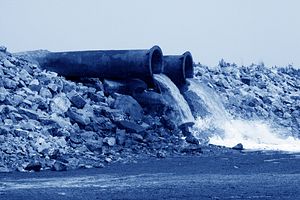Much has been said about China’s air pollution dilemma, with smog so thick in many urban areas that simply getting to and from work can pose a health hazard. Less has been written about the pollution of China’s water. In fact, water pollution in China is at least as bad – so severe that it has been proven to cause gastrointestinal and other types of cancer in some villages. Although these “cancer villages” have been around since the nineties, the government only recently recognized their presence. Many times in these cases, the pollution is caused by chemical dumping from nearby factories.
Dumping of industrial chemicals, agricultural waste, and urban wastewater has contaminated China’s water resources such that over half of all rivers in the country are unsafe for human contact. About 70 percent of the water pollution nationwide comes from agriculture, particularly runoff from fertilizers, pesticides, and animal waste. The presence of heavy metals in seafood and rice has become increasingly common, passing on water contamination to the food supply. At the same time, while most water use comes from the agricultural industry in rural areas, poor households in the same areas find themselves increasingly disadvantaged when it comes to securing clean water. For these households, clean water has become progressively scarcer.
The main problem with China’s environmental control system has been one of enforcement. Water resource management involves many government institutions and insufficient coordination among them. What is more, local officials, who have been required to support local enterprises, have also had to uphold environmental laws. Because of the emphasis on generating GDP, the environment has been seriously neglected. Decentralization has led to taking into account the economic needs of the local area or province only. Decentralization of the coastal zone has also led to inattention to environmental needs. China’s coastline is extensive, divided into twelve units that are administered by separate bodies. Because of a lack of coordination and a beggar-thy-neighbor attitude, residents of these provinces have suffered as the environment has grown steadily worse.
China’s new Environmental Protection Law will take effect on January 1, 2015, and will address air, water and soil pollution, providing authorities with more power of enforcement than they previously possessed. Authorities will have the ability to hold regular violators for up to 15 days and to impose larger fines on polluters, while legally registered civil society organizations will be allowed to initiate litigation in the name of the public interest. Local governments will also be required to release information on pollution. This will replace the previous Environmental Protection Law and act alongside the existing Water Law of 2002 and the Water Pollution Prevention and Control Law of 1984. The new legal framework may help to reduce pollution to some degree, although the relationship between local government and local business will most likely continue to prevent any significant reduction in pollution.
The water pollution problem is grave, particularly given the growing scarcity of water resources. Surface and groundwater depletion are on the rise, while drought has increased in some regions. Northern China lacks adequate water, especially considering its large population. At the same time, water use efficiency is low, and there are no restrictions on water demand. Low water use efficiency is perpetuated by a system of insufficiently clear water rights. Lagging implementation of sewage and water infrastructure leads to inefficiently used and polluted water being dumped directly into the environment rather than receiving proper treatment first.
The problems associated with water pollution in China are institutional and cannot be sufficiently addressed until the underlying institutional issues are changed. The water rights regime needs to be improved, water efficiency encouraged, and environmental enforcement recentralized. Environmental agencies at the top need to be more strongly empowered. Without these improvements, Chinese citizens will continue to exist in an underdeveloped nation no matter how wealthy they become. It is the burden of the state, after all, to provide public goods such as clean water and clean air.
There is hope that China’s “War on Pollution,” declared at the National People’s Congress this past March, will eliminate some of the worst water pollution. The National Development and Reform Commission has announced that it will address agricultural pollution this year. In addition, RMB2 trillion ($330 billion) has been pledged to tackle water pollution. The best that the leadership could do would be to ensure proper incentives for economic agents not to pollute. They must be aware of the fact that they cannot win the war on pollution without fundamentally changing how the war is fought and who is leading the battles. With climate change settling in, the stakes are high and the pressure is immense; time is running out.
Follow Sara Hsu on Twitter @SaraHsuChina.

































